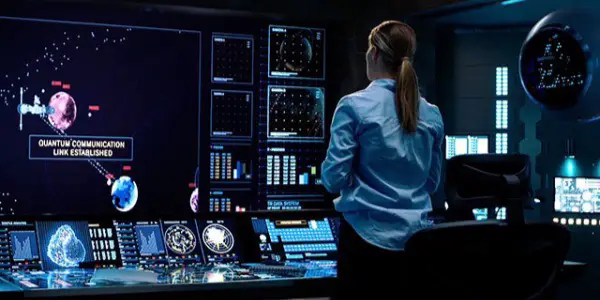If a film includes its own monolithic mysterious black object and not just one but two ‘star-gate’ style sequences, then comparisons to Stanley Kubrick’s 2001: A Space Odyssey will inevitably follow. This is before even discussing the narrative of Hasraf Dulull’s sci-fi feature 2036: Origin Unknown, a film which hinges around the concept of artificial intelligence, humanity and whether the two will ever be able to make it work.
Katee Sackhoff stars as Mack, a scientist supervising a remote mission to Mars via FTL communications. As such, she spends almost the entirety of Dulull’s 90 minute film completely alone in the control room with only A.R.T.I. (the A.I. system) for company. After an initial sequence depicting a previous Mars mission gone terribly wrong, it’s explained that there are now very few human supervisors in favour of A.I. taking the lead with these types of missions. Mack and A.R.T.I. are tasked with a recon mission, but they find something more than Mack ever bargained on.
Solitary Confinement
Of course, it’s hard not to see Katee Sackhoff in her stand-out role as Starbuck (Battlestar Galactica), especially in a film which has her sat at a control panel, commanding a space mission. Credit to Sackhoff, the memory of Starbuck quickly fades as she makes the far more subdued, yet still headstrong character of Mack come alive.

2036: Origin Unknown is at its best when it’s only Mack and A.R.T.I., confined to one room, acting out something akin to a bottle episode of a sci-fi television series. Restricting most of the action in the film to one room gives 2036 a unique angle and it’s one that really works for the most part. Sackhoff is a compelling lead, more than capable of keeping the audience engaged throughout. She does an enormous amount of the heavy lifting (playing against only the voice of Steven Cree), and her character goes through a pretty substantial arc throughout the film.
Setting the film in what is essentially one location means it can be easily passed off as a higher concept film. The attention to detail is well thought out, especially in terms of its sound-scape and sound-editing. 2036: Origin Unknown feels authentic and believable because of these small touches – from A.R.T.I.’s various mechanical noises, to how the tension is built slowly and carefully through the soundtrack.
2001: Take 2
The real problem for 2036: Origin Unknown is that it doesn’t just make overt references to 2001, it seems to be a copy and paste job of most of 2001’s signature motifs, themes and symbols. Kubrick’s sci-fi epic is not a film that many directors would want their work held up against and sadly, for Dulull, 2036 doesn’t hold up well at all. It’s 2001 without the atmosphere, the tension, the mastery and the cinematic experience.
2036: Origin Unknown also leans heavily into the Primer style of dialogue and exposition – science jargon and technical terms galore – but unlike Primer, it doesn’t lean heavily enough into the solid science to get away with it. There’s a lot of scientific terms thrown about that don’t necessarily seem to check out, and stall the narrative rather than propelling it forward.
There’s also a reveal about Mack’s father towards the middle of the film, which seems to exist solely so that Mack’s desire to see the mission succeed is cemented. This feels entirely unnecessary, as Mack’s determination, boldness and behaviour already speaks volumes about how dedicated she is to the mission. It feels, again, familiar to have a female character in a sci-fi film whose main motivation to succeed is intrinsically tied to their fathers (see Interstellar or Contact). Mack’s character would have been more authentic without this additional aspect, and may have been more progressive too.
Tonally, 2036: Origin Unknown plays out almost entirely one note, and sadly Dulull‘s final explosive commentary about humanity and planet Earth come a little too late to be appreciated properly. Rather than a slow burning, 2036 flips the script at the eleventh hour with a message that the film doesn’t really seem to commit to. The message feels trite, condescending, and above all else, smug – a payoff which no-one had been expecting because there is nothing throughout the film to suggest such a thing. Again, Sackhoff deals impeccably with her character’s inner battles and conflicts through this, but no amount of acting can disguise the issues at play here.
2036: Origin Unknown: Sackhoff Saves The Day
2036: Origin Unknown is not the most original or exciting film, but the real reason why the film isn’t as good as it could be is because the message feels lost. It takes too long for the real crux of the narrative to become known and, though hardly a new concept, it’s one which could have really helped the film to unfold. By the time A.R.T.I.’s true intentions are revealed, the film is almost over and the all that’s left is a feeling of ‘so what?’.
Sackhoff’s ability to pull off an almost solo performance is 2036’s saving grace and, in the end, is what makes 2036: Origin Unknown worth any of your time.
What do you think of 2036: Origin Unknown? Let us know in the comments below!
2036: Origin Unknown was released in the US on June 8, 2018. For all international release dates, see here.
Does content like this matter to you?
Become a Member and support film journalism. Unlock access to all of Film Inquiry`s great articles. Join a community of like-minded readers who are passionate about cinema - get access to our private members Network, give back to independent filmmakers, and more.